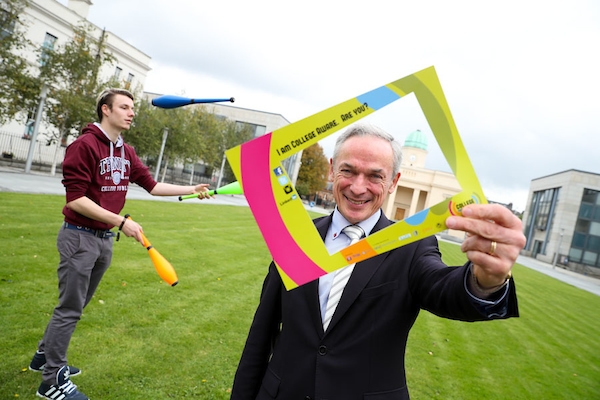Now entering its third year and running from November 21st to 27th, College Awareness Week, is an initiative that encompasses the benefits and importance of a third-level education while helping Irish students of all ages and abilities to become “college-ready”. Speaking to The University Times, Campaign Founder and Programmes Manager within Trinity Access Programme (TAP), Kathleen O’Toole Brennan, tells of how she believes the week will “capture the minds and hearts of the nation” through a range of interactive events. Last year, 100,000 participants were involved in various events held throughout the country. The campaign continued to flourish and this year it is set to see over 600 events and 170,000 participants from almost every county of Ireland.
College Awareness Week originated with a small outreach programme involving 10 Dublin primary schools. Organised by TAP, the group that works to enable those who come from under-represented socio-economic groups to come to the College, the children would take part in activities that helped them to understand college and see university as an achievable option in the future. The week of workshops would then finish with a “graduation” at Trinity. O’Toole Brennan knew the initiative “always had the potential to become more, and reach a much larger audience”.
The issue of college awareness is something that O’Toole Brennan feels she can truly relate to, as those closest to her never got the chance to finish their formal education. “My parents emigrated to Massachusetts and left Ireland without having completed primary school”, she explains. As a result of this, she was brought up in an environment where education was cherished: “They wanted our lives to be easier than theirs had been when it came to finding a job. We were always reminded of how an education would create and maximise our opportunities in life.” This close connection to the cause was a huge personal motivation for O’Toole Brennan. Dedicating a week to college awareness soon became her top priority as she realised it was finally time to make this “small, but enriching” outreach programme into a nationwide campaign.
Speaking to The University Times Gary Gannon, a member of the Social Democrats and a former participant of TAP, believes that the programme is key to creating a well-rounded workforce, something the awareness week is also keen to highlight: “ I came through the access programme, and in my class there were people from private colleges, from different parts of the country, there were people from TAP, and I liked that we were all involved.” Gannon argues that the “LC is not a properly good measure of intelligence” and that colleges lose “out on bringing some exceptionally capable people into Trinity College just because of the fact that they were born somewhere with low progression rates”. TAP participants are proven to integrate well into the college system with the average student receiving a 2.1, slightly above the college average. “The LC doesn’t capture that, and it never will, so that Trinity has done well is address the flaws in the LC and TAP does really well because it brings in exceptionally talented people and gives them opportunities,” says Gannon.
Conversations about education needed to happen in every single community in Ireland
Drawing inspiration from other highly successful events such as Culture Night, Engineer’s Week and Seachtain na Gaeilge, O’Toole Brennan wanted awareness around college to be recognised and celebrated in a similar way. “Conversations about education needed to happen in every single community in Ireland”, she determinedly explains. This simple idea turned into reality with the first College Awareness Week taking place in 2014.
This year, higher education institutions, libraries, primary and second-level schools, community and adult education centres and businesses across the country have all committed to delivering events as part of this campaign. Over the past two years, Trinity as an institution has been actively involved and its support will continue in 2016. Events will be held across campus during the week by TAP, the Mature Student Office, the Voluntary Tuition Programme (TAP) and Trinity College Dublin Students’ Union (TCDSU).
Some on-campus events happening during the week include the aptly named “CAWcktails”, which will be held by VTP. Speaking to The University Times about some of the details surrounding the event Lorcan O’Byrne, Chairperson of VTP, explained: “Essentially, we will be hosting an informal information session where our kids can mingle with the VTP tutors, while learning about different courses at Trinity, the college itself and society life”. The society’s values are closely aligned with the aims of the week and it’s obvious why they have been involved since the campaign began in 2014: “VTP believes that every child has the right to an education and to the pursuit of further education, no matter what their social or economic background.” According to O’Byrne, the goal of CAWcktails is “to break down the stigma which can surround the progression to third-level education, particularly at Trinity. We try to do this by bringing the kids into Trinity, showing them around and chatting informally about different aspects of student life – normalising the whole process.” CAWcktails is just one of the many interesting events taking place during the week.
Very often the students have a lot of potential, they just don’t see it
Part of the initiative is to host events which will reach a diverse audience. Prof Robbie Gilligan and Eavan Brady, from the School of Social Work and Social Policy, will be doing exactly that as they host an information workshop in the Graduates Memorial Building (GMB) on Thursday November 24th aimed at second-level students in foster and residential care. Speaking to The University Times, Gilligan highlighted how 6,000 young people are living in the care of the state with many of them never considering university as an option: “Often the children have had some difficulties in their lives, affecting their educational progress or, more than likely, their confidence in their education. Very often the students have a lot of potential, they just don’t see it.”

Through encouragement and awareness about third-level education for both students and their carers, Gilligan believes this event will act as a reminder that education is a valuable asset, especially for those in care who may otherwise miss out. Gilligan himself worked in foster care for many years and, as a result, has dedicated his career to researching foster care and education. He and Brady, who is a PhD student, wish to make a difference. “Research can be challenging because it is important for it to be useful, to make a difference in the real world and not to just benefit a handful of people”, Gilligan says with enthusiasm. He wishes to achieve this by applying his and Brady’s knowledge to practical situations with the event capturing this. The workshop is running for the first time this year and, although a new initiative, it has received “fantastic support” from organisations, including the Irish Universities Association (IUA), the Higher Education Access Route (Hear), the Disability Access Route to Education (Dare), Sólas, the Irish Foster Care Association and, of course, associations within Trinity, including TAP.
However, college awareness is not limited to one week only, and throughout the year interest surrounding such awareness has been generated through the use of social media, something that O’Toole Brennan says has been a fundamental part of the campaign. It was when speaking to transition year students at a Young Social Innovators event that she realised just how important an online presence would be in trying to reach second-level students. Of course, they are not the only group that College Awareness Week wishes to involve, but they are probably the largest and most impressionable. The campaign quickly picked up on this and a vibrant website, Facebook page, Twitter and Instagram account were created. O’Toole Brennan sees social media as a way of creating “buzz and excitement” around the week, as well as ensuring the campaign’s fundamental message is delivered to the “social media community”.
By bringing local role models to these schools, the next generation may be inspired to consider third-level education as a genuine option for them
College Awareness Week wishes to promote a “college-going” culture in certain areas with low progression rates. Not only will the Provost be visiting a Ballyfermot school struggling with such rates but, in association with TCDSU, the campaign has appointed students from every county as ambassadors who will return to their schools with traditionally low-progression rates to tell their “lived experience” of Trinity. It is hoped the audience will be able to relate to the ambassadors who were once, in OToole Brennan’s words, “walking in the same corridors as these students are today”. By bringing local role models to these schools, the next generation may be inspired to consider third-level education as a genuine option for them.
Primary and second-level students are at the heart of the campaign’s mission. O’Toole Brennan, however, wishes to stress that information on third-level education is open to all. The Mature Students Office in Trinity and the adult education sector have dedicated themselves to the initiative and wish to promote third-level education to those who feel they may have missed their opportunity. They will do this by extending a hand to prospective mature students through the “Discover Trinity” programme.
In its first two years, College Awareness Week has been exceptionally well-received. Partnerships have been forged with national organisations including the National Institute of Guidance Counsellors, the Department of Education and Skills; Ibec, the largest business representation organisation in Ireland; and the National Association of Principals and Deputy Principals. The initial and continued funding of corporate sponsors AIB and Perrigo has helped College Awareness Week to grow by building its website and providing merchandise and advertisements. When you consider that until three years ago this was just a small outreach programme, it is remarkable to see its growth into a national campaign. With increasing support from organisations and the general public, College Awareness Week hopes to continue to grow and inspire thousands of people from across the social spectrum, helping them to realise their potential and see third-level education as a viable option rather than an impossibility.
Correction: November 29th, 2016
An earlier version of this article incorrectly stated that Robbie Gillian was in foster care. In fact, he worked in foster care for many years.







